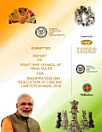Indigenous Sovereignty and the Democratic Project
জানু ২০২৩ · Taylor & Francis
ইবুক
192
পৃষ্ঠা
family_home
যোগ্য
info
reportমূল্যাংকন আৰু পৰ্যালোচনা সত্যাপন কৰা হোৱা নাই অধিক জানক
এই ইবুকখনৰ বিষয়ে
Liberal democracies are predicated on popular sovereignty - the ideal of government for and by the People. Throughout the developed world indigenous peoples continue to deny legitimacy to otherwise popular governments because their consent has never been sought. Using examples from Australia, New Zealand, Canada and the USA, this book tackles the problem of democratic legitimation from the perspective of indigenous peoples, arguing that having suffered conquest, these people cannot be said to consent until conditions for their consent have been realised. These conditions include constitutional change that recognizes indigenous law as the 'law of the land' - a radical proposal going far beyond the current limits of self-determination.
লিখকৰ বিষয়ে
Dr Steven Curry is Research Fellow at the Centre for Applied Philosophy and Public Ethics, University of Melbourne, Australia. He previously worked at the Centre for Applied Philosophy and Public Ethics at Charles Sturt University, Australia.
এই ইবুকখনক মূল্যাংকন কৰক
আমাক আপোনাৰ মতামত জনাওক।
পঢ়াৰ নির্দেশাৱলী
স্মাৰ্টফ’ন আৰু টেবলেট
Android আৰু iPad/iPhoneৰ বাবে Google Play Books এপটো ইনষ্টল কৰক। ই স্বয়ংক্রিয়ভাৱে আপোনাৰ একাউণ্টৰ সৈতে ছিংক হয় আৰু আপুনি য'তে নাথাকক ত'তেই কোনো অডিঅ'বুক অনলাইন বা অফলাইনত শুনিবলৈ সুবিধা দিয়ে।
লেপটপ আৰু কম্পিউটাৰ
আপুনি কম্পিউটাৰৰ ৱেব ব্রাউজাৰ ব্যৱহাৰ কৰি Google Playত কিনা অডিঅ'বুকসমূহ শুনিব পাৰে।
ই-ৰীডাৰ আৰু অন্য ডিভাইচ
Kobo eReadersৰ দৰে ই-চিয়াঁহীৰ ডিভাইচসমূহত পঢ়িবলৈ, আপুনি এটা ফাইল ডাউনল’ড কৰি সেইটো আপোনাৰ ডিভাইচলৈ স্থানান্তৰণ কৰিব লাগিব। সমৰ্থিত ই-ৰিডাৰলৈ ফাইলটো কেনেকৈ স্থানান্তৰ কৰিব জানিবলৈ সহায় কেন্দ্ৰত থকা সবিশেষ নিৰ্দেশাৱলী চাওক।




